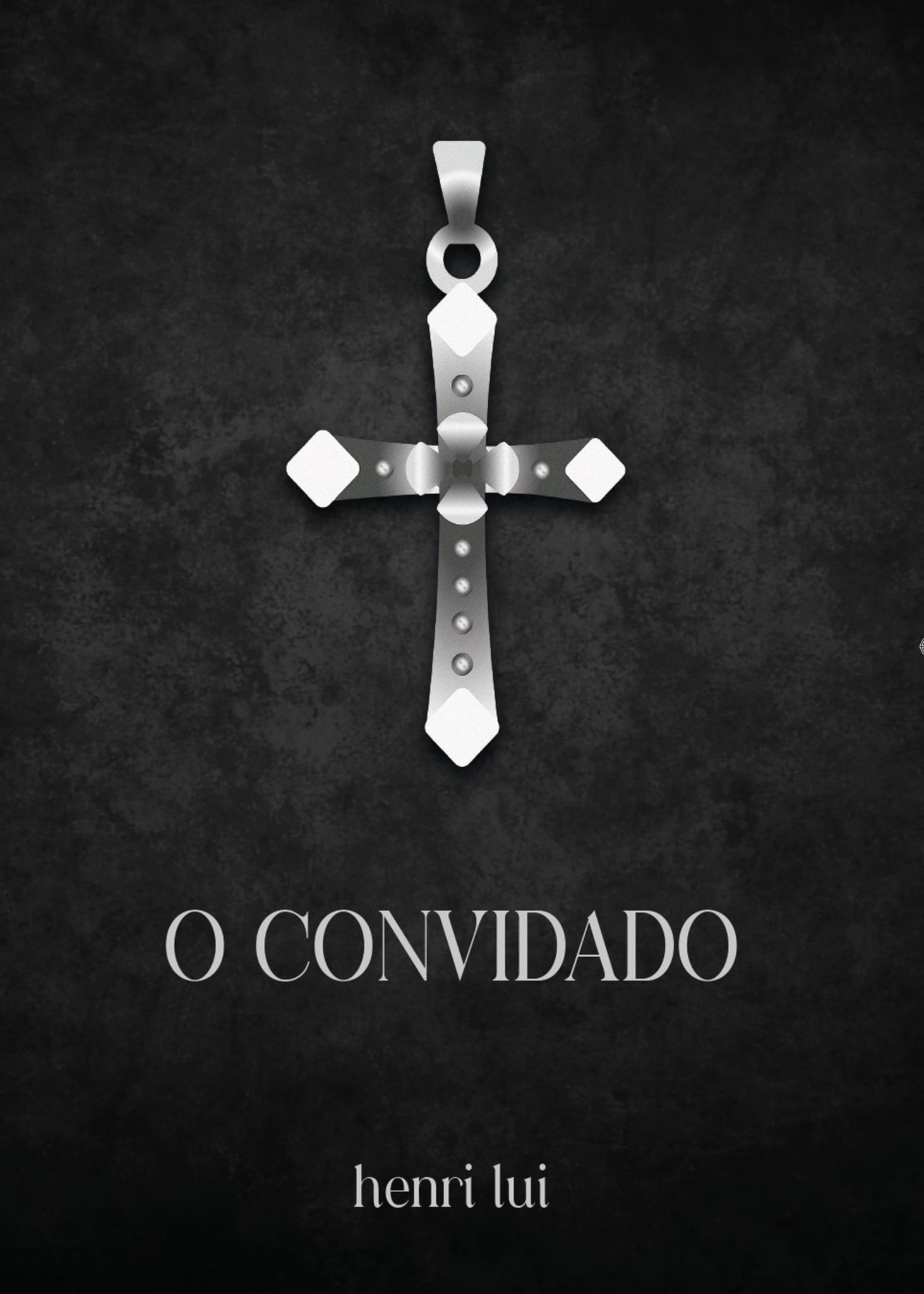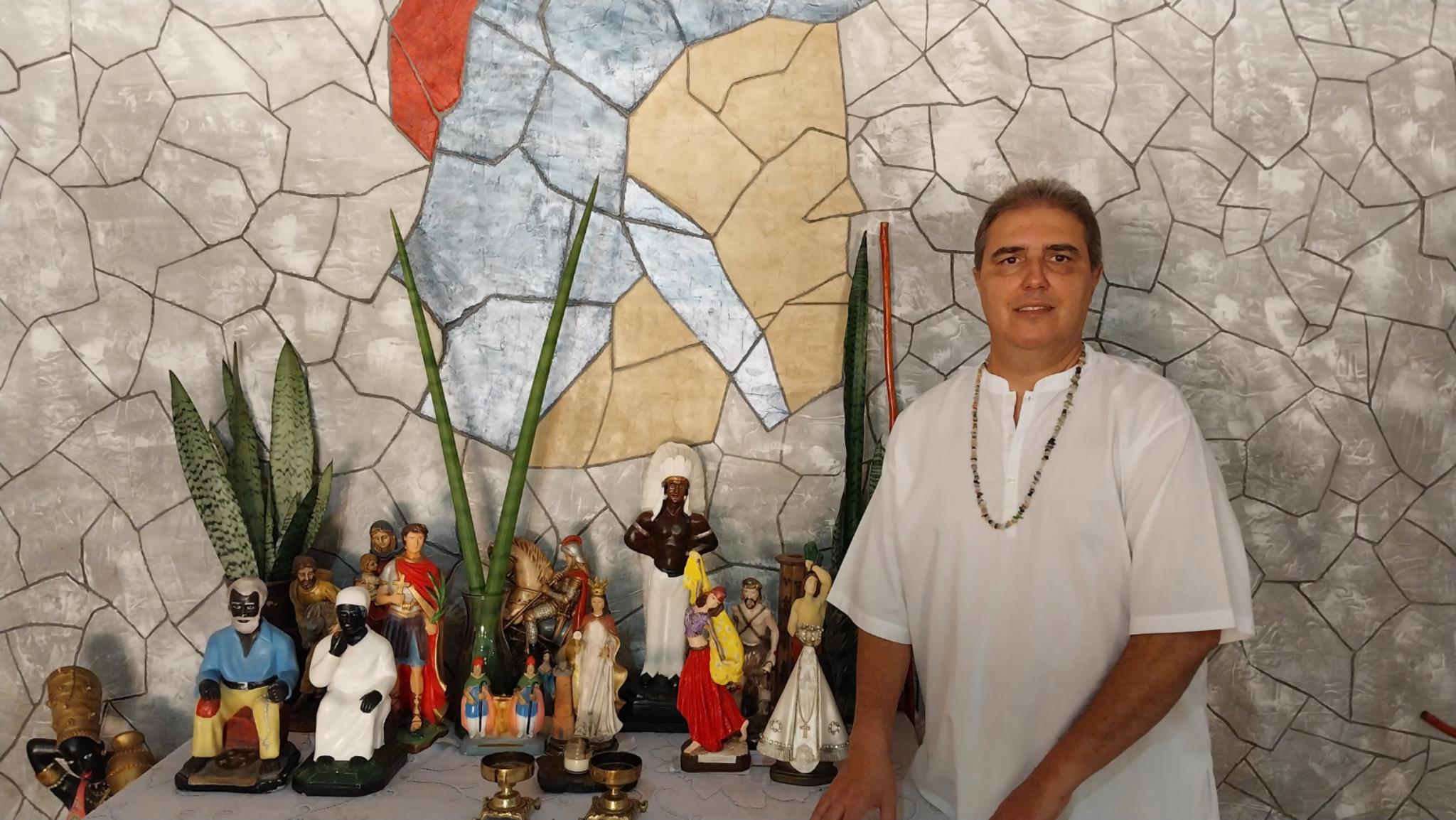Within the seemingly perfect Marah family , dark secrets and betrayals intertwine in a whirlwind of drama and lies. In “The Guest”, writer Henri Lui lays bare the hypocrisies hidden behind the elegant facades, revealing that beneath the polished surface lie obscurities that challenge morality. With influences from 19th century Russian literature, the work delves into the psychological depths of each character, weaving an intricate plot of mystery and intrigue that holds the reader until the last page.
How did the idea of writing “The Guest” come about and what inspired you to explore the themes of betrayal, murder and family hypocrisy?
I have a friend who worked as an advisor to a judge at the Court of Justice, and she told me that he charged bribes of around R$20,000 to vote in favor of certain processes. I had the idea of writing a novel about this: a corrupt judge. The same night I finished my first book, I started writing “The Guest”. It turns out that I only had one idea, which was the first chapter of the first part of the work, the corrupt judge and his family. So I wrote the first chapter with the family. Not even the second chapter had pre-conception – Ofélia and Sérgio.
From then on, ideas emerged with each new chapter, and it continued like this until the end of the book. Every end of a chapter, I was sure that there would be no more story, because I had no idea what to write in the next one. This happened from the second chapter of the first part, until the last chapter of the tenth part, because, on the penultimate page of the book, I didn’t know how it was going to end. Ludovico’s decision to tell his story only occurred, both for me and for him, when the priest visited his room. So, all events, tragedies, crimes, vices and human virtues were not preconceived. They emerged as the characters emerged and developed during the narrative.
In “The Guest”, the Marahs are portrayed as a seemingly perfect family, but full of secrets. What message do you hope to convey to readers by exploring this duality?
That we, human beings, are like the moon: we always have a hidden face, at least at a given moment, sometimes for a lifetime. We have a dark side, guarded, difficult to see or insurmountable, which sometimes only consciousness knows, but which, sometimes, due to circumstances in life, ends up being revealed without this being the intention. The face we show is the apparent one, but we have the one kept deep in our chest or deep in our consciousness, that face, that dark side that no one knows about.
You were inspired by the classics of Russian literature to write this novel. How do these influences reflect on the narrative and characters of “The Guest”?
I think I was inspired by the 19th century first, because almost all of the novels I read are from this century, from romanticism. Within this perspective, Russia in fact assumes a predominant role both in my reading and in influencing the development of the narrative, its style, its form… Everything must come from mere reading influence, not from merit, certainly from the romanticism of the 19th century and Russian writings, but there is also influence from other writers: Vitor Hugo certainly, Thomas Mann, Balzac, Camus, Charles Dickens, Oscar Wilde, even Proust… also deserves special mention Robert Musil, Sommerset Maugham (human bondage) and Henri Field, with Tom Jones.
The book doesn’t talk about Russia, but it talks about her… the characters have Russian names, I talk about the Ural mountains, train travel, Pétia is from Petersburg… Sankt is from São (Petersburg). There’s the cold, the landscapes and, of course, the romantic narrative, which certainly has this characteristic coming from reading 19th century novels and my appreciation for this social, cultural, artistic and even political movement, which began in the 19th century. XVIII, in Germany, and spread throughout Europe, around the world, and established permanent roots. It is a narrative characterized by extreme emotions, sentimentality, melancholy, passion, love and beautiful stories.
The book is divided into two main parts. How did you balance the plot between the Marah family dynamics and the entry of Fiódor (or Xavier) into the story?
As I said, I simply had no idea and had nothing preconceived other than the figure of a corrupt judge. Xavier’s entry into the second part came only after the first part of the book ended. And when he gets on the train, without a destination and without knowing what his life would become, I, as the author, also had no idea.
I wanted a book with ten parts, because of Anna Karenina, which has this format. But I didn’t imagine this five-part, five-part decision as it was made. The bias of the story pausing in one part and being resumed later seems purposeful and extremely preconceived, designed, formed in detail. But I only realized it when I started reviewing the book, after all the parts were ready.
Perhaps if I had this awareness, the desire or the idea to do it this way, I would probably remain stuck in this format and perhaps the narrative would not even develop. It was all by chance. I only had the idea of having ten parts, but it was a merely relative idea, somewhat pretentious, illusory and perhaps unattainable, as I never imagined myself capable of writing a novel of this size and complexity.
This balance was given by the characters themselves who dictated the rhythm of the story and events, leaving me as a mere instrument that expressed and concretized a plot dictated, decided, created and lived by them.
The characters in “The Guest” are complex and multifaceted. How did you develop their personalities and motivations throughout the plot?
I take this as a compliment, because this, in fact, was a constant concern, because I believe it is an indispensable or essential requirement for a novel. The psychological wealth, the mental reserves, the tricks, the streams of consciousness, the vices and virtues hidden within a remote unconscious or jumping out into the open in any breath or attitude. This makes a work rich, of course, within the conception of a good plot and good writing. I would say it is the color of the narrative, what sharpens, captivates, awakens the reader, or more than that, leaves impressions or memories in them, brings that ineffable pleasure that is reading a novel and experiencing that novel. So, of course there was this concern in me, and I often believed, after reviewing the work, that there was no complexity in the characters, in their personalities, much less this adjective of “multifaceted”. So, once again, thank you. Now, to complement this answer, I will amend it with the answer to the sixth question.

The theme of mourning is explored in the story with the early death of Nikolau . How does this experience affect the members of the Marah family and shape the course of events?
What I’m going to say here would be frivolous if I didn’t say it, even though it may seem difficult to believe, but for me, within my experience with the creation of the work, with my sensations and impressions, it was the purest reality . It’s not about false modesty or anything like that.
I had preconceived, as I said, only the figure of a corrupt judge. After I drew his family, I got the impression, which grew more and more, that Nikolau would be the main character of the story, even though he didn’t yet have any characteristics that could make him the main role in the narrative. But it could be something like Principe Mythcin , in “The Idiot”, by Dostoevsky – just as an illustration, far from any comparison, for God’s sake!
I actually intended to send him to the hospital because he wasn’t eating. It turns out that, from the moment he entered the hospital , I said to myself: he’s going to die! And while, desperate, I said out loud “he can’t die!”, I, with my fingers, described his death. It was then that I realized that I did not have any decision or autonomy over the characters and that they were the ones who would dictate the course of events and their lives. I would be a mere instrument that would narrate this, as if I were putting down on paper the story of a film I had seen.
And then the characters arrived, appeared, left, acted as they saw fit. And the complexity of their conduct, their thoughts, their vileness, came only from them, the vast majority of which I didn’t even know about until they appeared. I often learned about their attitudes as they practiced them. There are several passages in which they act in relation to something they are going to do in the future that I had no idea about.
Nikolau ‘s death affected two people: his mother Natália, and me, who was left in mourning for days, lost and sad, without a pillar of the narrative, like Natália was left without a pillar of her family. Certainly the lack of this pillar, added to other events, contributed to his character deviation when he became involved with his supposed nephew, with whom his daughter was in love. But it stops there… In relation to Ivan and his sisters, Nikolau ‘s death did not affect them, it affected them at the time of the event, but it did not affect them afterwards at all…
What was the writing process like to create the mysterious and twisty plot of “The Guest”? Did you have the plot completely planned out from the beginning, or did some twists come up during writing?
Yes, this answer was given above and in the previous ones. I only had the idea of the corrupt judge. The rest of the plot was created by the characters, without me having it, and I often felt like that, as was the case with Nikolau ‘s death , any decision-making power or even influence over these events leaving me. That’s how I felt, like an instrument rather than an author, who continues to this day without understanding the work I create.
How important is it to explore psychological issues and intimate problems of the characters in “The Guest”? How does this contribute to the depth of the story?
I think I said a little about this above. It seems to me to be another necessary requirement to color the plot, to bring depth to the story. The contribution is total, dependent and fundamental. After a good understanding and good writing, come the characters and, of course, their personalities, their complexities… This is what defines a story as a Romance, as literature. in my view. Just imagine Raskolnikov without psychological depth in “Crime and Punishment”. But, as I also said, I thought I had failed or not achieved my intention in this regard after reviewing the book.
What is your journey as a writer like, since your debut with “J.” until the release of “The Guest”? What are your future writing plans?
It is almost, or perhaps it is, in fact, Karma… adding that the concept of this word does not refer to something negative. But it’s not, it wasn’t an act of will. If it were up to her, I wouldn’t have written either of the two books, nor the rest of the writings I have. I think it’s something that my soul always asks for, something that happens when, faced with a blank paper, I feel an almost physiological need to create something that doesn’t exist through words – and that, if I don’t do it, my conscience won’t stay. in peace.
I taught myself to read when I was three years old. And, although I knew how to speak, I only started saying sentences when I was 4 or 5 years old. But, since I was three, I was reading and running away from any closed place I was in: home, school, crib, which I fell into every night because I climbed over it to get out of it, until my mother decided to put me in a bed. I still have this phobia to this day, and I get hurt a lot when in dreams, or when I’m awake without knowing where I am, or the direction of where to go, even if it’s inside my room, kind of sleepwalking . This phobia makes me run, struggle, and, as it’s dark,. I can imagine the tragedy of the events until I wake up.
Later I discovered that I have autism spectrum to a certain degree, and this made many things explain themselves and make sense within me, even bringing, in addition to resilience, a certain acceptance of myself, in the face of my oddities and idiosyncrasies .
About plans… I wrote song lyrics when I was young, even without having a band. During the pandemic, I discovered, on a computer, almost a hundred “poems” that I wrote between 2012 and 2013, even though I didn’t like or read poetry.
And this meant that, from then on, I dared to use certain writings, which are not poems, but are described, with the idea of deconstructing the writing of a poem, as if they were kais in some, or as a form and rhyme even in structured poetry. But always with the idea of deconstructing any preconception you may have in order to create something literary, from a chronicle to an anthological novel. And now there are more than 300 of these described, which will be launched at the Book Biennial in SP, along with the second edition of “O Convidado”, which is also being translated into English and is on all digital platforms.
But “The Guest” took me eight years of daily work: two years to write the story and six years revising it, while I didn’t date, I didn’t go out, I didn’t even have sex. I worked and wrote. And it is a lonely, painful, silent, extremely laborious process and you often wonder if it makes sense to dedicate yourself to it for so long, giving you a certain fear that you are wasting your life, your days on something that will have no value simply for the sake of it. fact that you don’t have that literary gift, but unfortunately, you haven’t realized it yet. For me, it is also a therapeutic process, and it was a means of survival, literally, in the most critical phases of my life.
But now I’m writing short pieces that are easier and less painful, perhaps as a way to escape this routine of a new novel, even though it has already started, once again not by my will. I was in the sea watching videos of David Bowie on the sofa in the living room drunk, and then something happens, you know, a pop, and then everything is a trance. I got up, took my notebook, sat down in the front area of the house and started writing, not knowing what, what for, or whether it was the beginning of something, or something in itself, or the end of something, or if it was nothing. You simply write and, when I try to remember or rationalize the feeling I have, it’s that there wasn’t much rational there, at that moment, not that of ours, that of our knowledge. Everything is very sudden, unexpected, ineffable, and, why not, from a certain point of view, absolutely instinctive, even bordering on the irrational, but not of an inability to think, but of being in another aura, another sphere, another plane, as if in a trance. Maybe even the look would be different, the behavior, like an autism crisis, if my spectrum were a little bigger.
And I discovered these pages years later, because I didn’t even remember them. And then I managed to get there that day, but I didn’t remember anything, and the literary quality impressed me, and worried me, because it’s not possible to maintain it. And it is not possible to understand that it was me, in this state now, for example, in this plane of consciousness, who wrote that. But this is the beginning of a story, which certainly won’t leave me alone until it’s finished.
I just hope that I can turn it into a 90, 100 page novel, and not a 700, 1000 page novel, as has crossed my mind several times … Although it is one of the most incredible experiences you can have in your life , she’s lonely, and I’m tired of being alone. I even have a certain phobia of loneliness, and perhaps that’s why I’ve had difficulty getting back to reading novels at the rate I used to.
Born in Brazil, Luca Moreira holds a degree in journalism and a postgraduate degree in communication and marketing for digital media. He has distinguished himself through his impressive career as an interviewer. By November 2025, he had conducted over 2,000 interviews with personalities from 28 different nationalities. He is currently the CEO of the MCOM Global group and editor-in-chief of PopSize.





